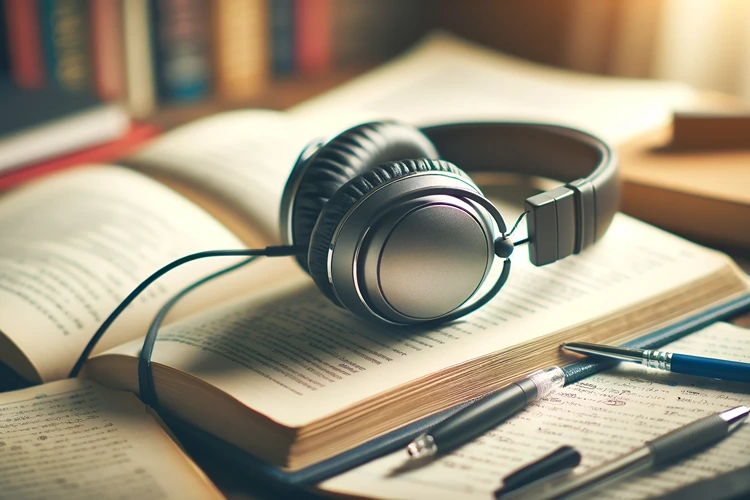Music’s role in enhancing study concentration and relaxation is both powerful and nuanced. Far from being merely background noise, the right melodies and rhythms can significantly elevate your ability to focus and relax. This article delves into the multifaceted ways in which music can transform your study sessions and relaxation periods into more productive and enjoyable experiences, highlighting the science and strategies behind enhancing study concentration with music.
Understanding the Impact of Music on the Brain
Music’s influence on the brain is both fascinating and complex. It’s not just about the beats and melodies; it’s about how these elements trigger a wide range of responses in our brain’s circuitry. This connection between music and the brain has significant implications for both studying and relaxation.
How Does Music Affect Our Emotional State?
Ever wondered why certain songs make you feel happy, sad, energized, or relaxed? Music’s ability to evoke emotions comes from its direct route to the limbic system, the part of the brain involved in feelings and memories. This emotional response can be leveraged to create a conducive study environment or to unwind after a busy day.
- Uplifting music can motivate and keep you alert during study sessions.
- Slow, soothing tunes can help reduce stress and prepare your mind for rest.
Can Music Enhance Memory and Concentration?
Yes, it can! Studies show that music can enhance cognitive abilities and memory by stimulating different areas of the brain responsible for these functions. For instance, classical music has been linked to the “Mozart effect,” a temporary increase in spatial-temporal reasoning abilities. While the science is still being debated, the anecdotal evidence is strong among students who report better focus and memory recall when listening to background music while studying.
The Role of Music in Reducing Distractions
With constant notifications and the hustle and bustle of daily life, finding focus can be challenging. Music, especially instrumental tracks, can create a sound barrier that shields you from disruptive noises. It acts as a buffer, allowing you to dive deeper into your work or studies without being constantly pulled away by distractions.
- Instrumental music or nature sounds can mask background noise, enhancing concentration.
- Music with a steady beat can help maintain a productive rhythm in your tasks.
Music’s Effect on Stress and Anxiety
It’s no secret that music can be a powerful tool for managing stress and anxiety. The right kind of music can lower cortisol levels, the body’s stress hormone, and promote relaxation. This is particularly beneficial when preparing for exams or decompressing after a demanding day. The key is to choose music that resonates with you personally, as everyone’s response to music is unique.
- Classical and ambient music are popular choices for reducing anxiety.
- Music with a tempo of 60 beats per minute can induce a state of relaxation that mimics the feeling of being asleep.
Understanding the impact of music on the brain opens up new avenues for enhancing our study habits and relaxation techniques. By consciously selecting music that aligns with our current needs—be it focus, motivation, or calm—we can significantly improve our cognitive and emotional well-being.
Helpful Hint:
Listening to instrumental music without lyrics is often recommended for studying to minimize distractions. This can help maintain focus on the task at hand without the interference of vocal messages.
How Music Enhances Concentration

Choosing the right background music can significantly boost your focus and productivity. It’s not just about filling the silence; it’s about creating an auditory environment that encourages concentration. Different types of music and sounds have unique benefits for concentration and cognitive function. Let’s delve into what types of music are most beneficial and why.
Why Is Classical Music a Go-To for Studying?
Classical music’s structure and rhythm have a calming effect on the mind, making it easier to focus. With no lyrics to distract, it can be the perfect backdrop for reading, writing, or any task requiring deep concentration. But why does it work so well?
- It improves mood, which indirectly boosts motivation and focus.
- The variations in tempo and dynamics can keep the mind engaged without becoming a distraction.
- Studies suggest that classical music may enhance brainwave activity linked to memory and attention.
How Do Nature Sounds Promote Concentration?
Nature sounds, like rain falling or waves crashing, offer a consistent auditory backdrop that can enhance cognitive function and focus. These sounds are often nonlinear, meaning they are unpredictable but in a soothing way. This unpredictability can keep your mind gently stimulated, preventing it from wandering without causing distraction. Here’s how nature sounds can be beneficial:
- They reduce stress, creating a relaxed but alert state ideal for studying.
- Nature sounds can mask distracting background noise, making them great for open or noisy study environments.
- Listening to the sounds of nature has been linked to improved mood and deeper concentration.
What Makes Video Game Music Effective for Concentration?
Video game music is composed specifically to keep players engaged and focused on the game without distracting them from the task at hand. It’s an underutilized resource for students and professionals alike. Here are some reasons why video game music works so well:
- It is designed to loop seamlessly, providing a consistent auditory experience that helps maintain focus over long periods.
- The rhythms and melodies are engaging enough to keep energy levels up without overwhelming the listener.
- Many video game tracks are instrumental and feature motivating beats that can enhance concentration and task performance.
Choosing the Right Playlist: Tips and Tricks
Finding the perfect playlist for studying or working can be a game-changer for your productivity. Consider these tips when curating your concentration playlist:
- Experiment with different genres and sounds to find what works best for your concentration and cognitive style.
- Pay attention to how different music affects your mood and productivity. What helps you focus might not work for someone else.
- Consider instrumental tracks or those with minimal lyrics to reduce the chance of distraction.
- Use music streaming services to explore curated playlists designed for study and concentration.
Music’s power to enhance concentration is undeniable. By carefully selecting the type of music you listen to while studying or working, you can create an optimal environment for focus and efficiency. Whether it’s the soothing strains of classical music, the natural harmony of environmental sounds, or the dynamic rhythms of video game scores, the right background music can elevate your concentration to new heights.
Pros
- Music can significantly decrease stress levels.
- It aids in better sleep, essential for effective learning.
- Listening to music can improve mood, boosting overall well-being.
Cons
- The wrong type of music can actually increase anxiety.
- It may become a distraction if not chosen carefully.
- Over-reliance on music for relaxation can hinder the development of other coping mechanisms.
Music Therapy: A Tool for Enhanced Learning and Relaxation

Music therapy, an established health profession, uses music to address physical, emotional, cognitive, and social needs of individuals. Its benefits in improving mental health, reducing stress, and enhancing focus are particularly relevant for those looking to boost their learning efficiency and relaxation.
By incorporating music therapy into study and relaxation routines, individuals can tap into the therapeutic qualities of music to facilitate deeper learning and more effective relaxation. Techniques might include listening to specific therapeutic compositions, engaging in guided imagery with music, or even creating music as a form of expression.
This personalized approach not only aids in stress management but also improves concentration, memory, and emotional well-being. As a versatile tool, music therapy offers a unique pathway to achieving a balanced state of mind, essential for both productive study sessions and deep relaxation.
Implementing Music in Your Study Routine
Creating a study environment that enhances focus and productivity is crucial for academic success. Music, when used correctly, can be a powerful tool in this process. Integrating music into your study sessions involves more than just playing your favorite tracks. It’s about selecting music that enhances concentration, setting the right volume, and timing your study sessions to maximize efficiency.
How to Select Music That Boosts Concentration?
Not all music is created equal when it comes to studying. The goal is to find tunes that enhance, rather than detract from, your focus. Here are some guidelines:
- Opt for instrumental tracks to minimize lyrical distractions.
- Choose music with a steady rhythm to promote a focused study pace.
- Explore genres like classical, jazz, or ambient music, known for their calming effects.
Why Is Timing Important in a Music-Enhanced Study Routine?
Incorporating breaks into your study routine is as important as the study session itself. Music can signal these breaks:
- Use a timer to schedule breaks every 30 minutes, aligning with the Pomodoro Technique for optimized productivity.
- Switch up the music during breaks to something more upbeat to refresh your mind.
What’s the Ideal Volume for Study Music?
The volume at which you play your study music can make a big difference. Here’s how to get it right:
- Keep the volume low enough to blend into the background, not so loud that it becomes a distraction.
- Adjust the volume based on the complexity of the task at hand; lower for high-concentration tasks, slightly higher for more mechanical tasks.
Implementing music into your study routine thoughtfully can transform your study sessions from mundane to motivational. It’s not just about playing background music; it’s about strategically using music to enhance your focus, manage your time, and make studying an enjoyable process. With these tips, you’ll be well on your way to creating a study atmosphere that not only boosts concentration but also makes learning a more pleasurable experience.
FAQs
Wrapping Up
In wrapping up, the significance of music in boosting study focus and facilitating relaxation cannot be overstated. Selecting music that aligns with your study goals and relaxation needs can profoundly transform these moments into more effective and pleasurable experiences. It’s crucial to curate a playlist that not only enhances concentration but also supports your personal and academic development. Allow music to be your ally in the journey towards knowledge and well-being, embodying the essence of enhancing study concentration with music.
Additional Resources
- American Music Therapy Association: Official site offering resources on how music therapy can aid in educational settings and mental health.
- Classical MPR’s Classical Kids Storytime: Features classical music with stories for kids, illustrating the use of classical music in educational content.
- Brain.fm: Provides music designed to enhance focus, relaxation, and meditation, backed by science.
